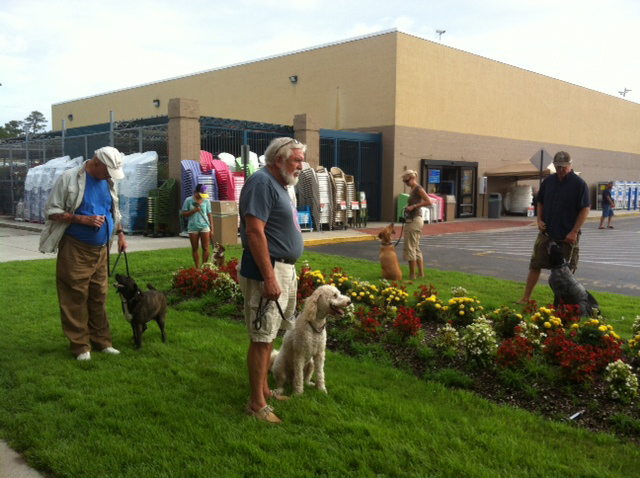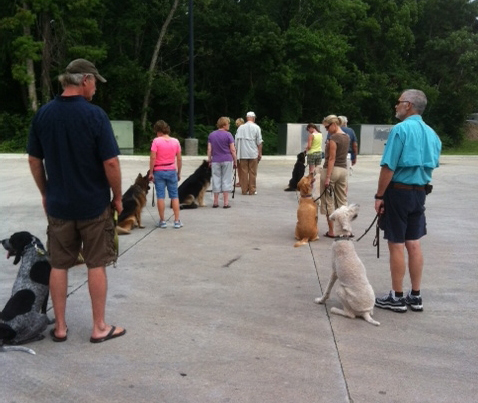The Structure of Group Programs at Greater Coastal Canine
It is my belief that group environments should be well structured, have enough trainers per
class, and more importantly be utilized as part of a continuing learning process. Often times
the dynamics of a group class are not necessarily conducive to learning. Years of experience
and research have brought me to this conclusion:
When I decided I wanted
to become a professional dog trainer I knew I needed to
develop my own approach.
My first two years were
spent doing an apprenticeship under a well renowned
dog trainer from
Germany
.
Her philosophy was a positive
approach, and provided me with two awesome years of hands on training. From this I gained knowledge,
not only in obedience training, but behavioral work as well.
Towards the completion of my two years, one of my final assignments was to present to my
trainer a thesis on my own approach. Documenting all the details of how I came to it. I felt
that in order to complete this, it was important to go out and visit other training schools,
and learn other training protocols. During this time I chose to emphasize on the
Learning Dynamics of Group vs Private Training”
My past year and a half had included teaching both private and group students. Yet, I was
more convinced that the group dynamics was a better proofing stage after students had an
understanding of how to work with their learned obedience from private lessons.
If a dog trainer’s job is to teach both the human and canine,
If a dog trainer’s job is to teach both the human and canine,
what was the best environment to accomplish this?

So, I enrolled in multiple group classes,
from basic obedience, to AKC competition.
I went to six different schools, with three
different dogs. I interviewed hundreds of pet
dog owners, to get their experiences on
what they felt worked best for them. I worked
with really good dog trainers, and some
really bad ones. I can safely say this aspect of my apprenticeship was probably my most valuable
learning experience.
It was not until I got
involved in Schutzhund training that I really
began learning about dog training as a whole.
Although Schutzhund (Protection Dog) in German has been
geared over the years towards the German shepherd, the principles of the training can be
applied to not only advanced training, but simple manners as well. In a nutshell, my
Schutzhund experience provided me with the most crucial factor that must apply to any
dog training protocol; the importance of focus. Once I came to this conclusion,
the question I asked my self;
“Can reliable focus be taught in a group environment?”
The answer from my experience is no. My conclusion is based on the dynamics of dog 
behavior, and how a dog learns. Upon entering a group environment without any prior training, a dog instinctively wants to go sniff, and explore members of their own species. This is normal dog behavior. Without training, the human at this point will start to pull
and yank on their dogs. Verbal commands, such as leave it, sit or come are used, and the dogs are still in an over stimulated state pulling as hard as they can to get to the other dogs, ignoring anything their human is saying. Bribery is than offered, and misunderstand by the dog.
The human than turns to the trainer and asks the all important question:
“What do I do now?”
Of all the schools that I attended, and all the trainers I worked with, each had a different approach to this all too common event... From correcting
the dogs with a leash jerk, to spending the first half hour of an hour class waiting for the dogs
to calm down. Needless to say the frustration of the humans fueled more chaos in the dogs.
By the second half hour of the class, the dogs were no more interested in their humans than
the man on the moon. Even the yummiest of treats proved futile.
The environment of the Schutzhund training proved to be the most effective approach.
In the learning phase of training each dog and human first received individual lessons.
No distraction at this point. The emphasis was to create the behavior;
focus, or teaching the dog that paying attention to the human was going to gain
them a positive end result; either a treat or a ball. I so enjoyed watching the success
in dogs having the opportunity to learn this way.
Go To Page 2 of 2
Dog training, puppy
training, dog obedience classes, pet manners classes,
clicker training classes, tricks classes, canine education, private dog
training, puppy socialization, in-home training, group
dog training classes,
kennel training, day training, board and train, pet first aid. Customized
behavior modification programs
for all dog behavior problems including house training, house soiling, dog
aggression, human aggression, nuisance barking,
children & dogs, destructiveness, chewing, digging, jumping on people,
jumping fences, multi-dog households, leash pulling,
separation anxiety, shyness, socialization, door bolting, running away,
hyperactive dogs, dog fighting, biting, growling,
anxiety biting, stress biting. Techniques incorporating positive
reinforcement! Training OBX Outer Banks,
Dog Training OBX Outer Banks, Training Kitty Hawk, Dog Training Kitty Hawk,
Training Currituck, Dog Training Currituck,
Training Kill Devil Hills, Dog training Kill Devil Hills, Training Nags Head,
Dog training Nags Head,
Dog Training Eastern North Carolina, Dog Training North Carolina, CGC training
& CGC testing, Dog training seminars,
Home Remodeling, Grooming, Dog Grooming, Dog day care, doggie day care,
Dog,
